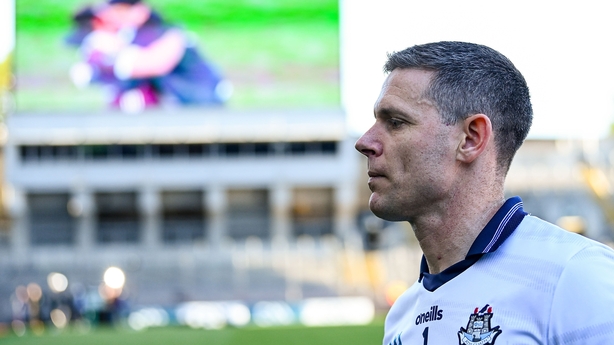With everything going on, it took me four and a half hours to drive from Westport to Dublin for punditry duty last Saturday.
And watching the Kerry-Derry game the following day, it felt like it dragged on almost as long.
The table of events in Dublin city last weekend was reminiscent of the football championship – too much squashed into too narrow a timeframe.
By the time the draw for the semi-finals was confirmed after the fourth quarter-final eventually finished, it was surprising to learn that Derry still weren’t somehow in the thing.
It’s fair to say they won’t be missed for the remainder of the championship – sad to acknowledge after their electrifying league final performance, which now feels like a long time ago.
The Kerry-Derry game, which was probably the most hotly anticipated of the weekend’s matches, confirmed beyond all doubt that Gaelic football needs rule changes of some description.
I thought it couldn’t have gotten any worse than the Armagh-Roscommon match on Saturday but I was badly wrong. The game was so bad it could be a watershed.
It was a horrible spectacle, and all the more depressing given the quality available to both sides.
Aside from their defensive framework, Derry seemed to lack any plan to hurt Kerry at the other end of the field. Even as the game slipped out of reach in the final quarter, they remained in their defensive shell and seemed to lack any real ambition to go and win the match. One does wonder if their confidence is still dented from the Donegal game.
I’d be inclined to cut Kerry some slack given the system they were facing. I also suspect they learned heavily from last year’s game, when Gareth McKinless got in behind them for a goal very early on. Only for a late surge and Derry’s poor finishing in the endgame, they’d have wound up beaten in that game.
They were anxious not to get caught like that again. They retreated back into their defensive shape, were very cautious in their use of the ball and just ground it out.
Jack O’Connor won’t give one single damn about the complaints of the pundits and the neutrals. For him, and everyone else in the camp, it’s all about results.
Will they be as negative again? If necessary, yes. Perhaps it won’t be as extreme against Armagh but it may not be a million miles away either.
The fact is that it made tactical sense for Kerry to adopt the approach they did against Derry. And that’s the problem. It’s not as if we haven’t been here before.
Ten years ago, they set up to mirror Donegal in the 2014 All-Ireland final. It resulted in a dismal game but Kerry picked up Sam at the end of it.
So that’s where the rule-makers have to step in. To engineer it so that it doesn’t pay to play this way.
What rule changes are needed?
The two-point arc from 40 metres is definitely worth a try. It would both encourage the attacking team to shoot from distance and also force the defensive team to push out slightly to prevent the two-pointer. This would have the added effect of creating more space in closer to goal, allowing the opportunity for more direct kicking into the 21.
I’m instinctively in favour of the regulation to keep attacking players inside the opposition 45 at all times, although I could see there might be issues in policing it. Perhaps a job for the linesman to keep tabs on.
There was probably another under-played factor which may have contributed to the cagey fare in the Kerry-Derry game.
Kerry went into the weekend as second-favourites for the All-Ireland and the previous evening, they watched Dublin getting knocked out of the championship.
I’d imagine their psychology around the game completely changed. I know from my own time, every team is preoccupied with Dublin.
They probably thought ‘Wow! We have a crazy opportunity here! Let’s not muck it up now!’ I’d say they tightened up in response to that.
I watched the Dublin-Galway game alongside Ciarán Whelan in the analysis booth in Donnybrook. At half-time, myself and Whelo had the game written off. ‘This match is gone. Dublin are cruising’, etc, etc.
With 15 minutes left, the mood music had changed dramatically and Whelo turned to me and said ‘F**k, this is gone too sticky for my liking… there’s something not right here.’ He could see the writing on the wall at that stage.
Before commenting on the obituaries that are being written for this generation of Dublin football, we have to pay tribute to a sensational effort from Galway on the night.
All the more so when you consider what came against them. Seán Kelly going off after 20 minutes, a strapped up Rob Finnerty struggling to get a shot away, Damien Comer – though he worked like a demon to influence the game – not at full fitness. Shane Walsh had one of his insane games, almost on a par with his 2022 All-Ireland final display, but even he was hobbling about for a fair portion of the evening.

Their defensive performance in the second half was on another level. Sean Mulkerrin was a warrior all evening and won so many turnovers. Johnny McGrath and Jack Glynn are phenomenal corner-backs. Dylan McHugh is a guaranteed All-Star at this stage. Because of their high-profile forward talent, their defence has been underrated but they’ve only conceded one goal in championship this year and that came from a goalkeeping error on a kickout.
Further up the pitch, Johnny Maher did a cracking job on Brian Fenton and chipped in with a point, to boot. And then when Walsh began to struggle with the injury, Cillian McDaid decided to deliver a tour de force of point-kicking in the second half.
Looking at their squad depth, one is inclined to wonder whether their difficult league campaign wasn’t an enormous blessing in disguise. It forced them to blood so many young lads, who are now looking comfortable in big games.
If Galway got the benefit of being forced out of their comfort zone in the league, Dublin might have paid the price for being stuck in the comfort zone too long.
From our own perspective, there were obvious echoes of the 2021 semi-final. The loose Tom Lahiff pass at the end, which Comer seized on, reminded me of Niall Scully giving the ball away in the exact same corner in ’21.
They were 11-7 up against Galway at the weekend and 10-4 up at half-time against us. They were comfortable.
All too comfortable. Until it’s not.
And because you’re in the comfort zone for so long, when the game suddenly gets uncomfortable and there’s a touch of madness in the air, you can’t shift your mindset in time.
But time moves on. Dessie Farrell is getting some flak for starting Jack McCaffrey, James McCarthy and Paul Mannion but if they’re available, I’d be inclined to go with them. They played most of the game – and McCarthy played the whole game.
The simple truth is they just don’t have the depth they once did. Their bench, which was such a potent weapon for a long time, is now nothing to be feared.

Dessie was hinting strongly at the end of an era on Saturday evening, that we’d seen the end of a few of their greatest players. You’d assume McCarthy and Michael Fitzsimons may call time. Cluxton is a funny one and the exception to all rules – he could still be there when he’s 80 for all I know.
But even some of the others, the 1993 born players are all hitting 32 next year. Fenton, Kilkenny, McCaffrey, Mannion – a couple of them have sat years out in the past and wouldn’t surprise me to see them decide to do something different in life for a while.
Dessie could well decide to head for the exit door himself. The upshot of it is we could have a far more open championship in the years ahead. And hopefully more people come to see it.
